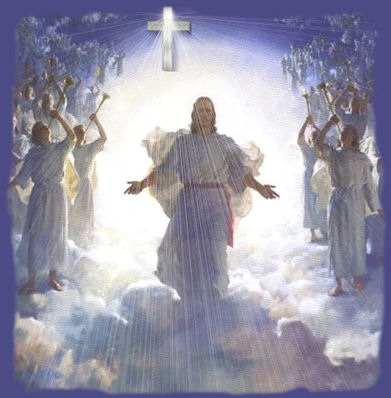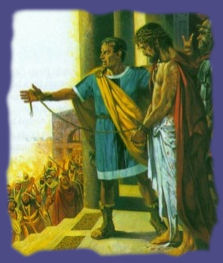|



Betrayed by one of His
own followers, forsaken by those closest to Him, they
who had been His bosom pals for three years, Jesus stood
before a mob agitated by the Temple Gang accused by
false witnesses of a capital crime by Jewish
Law—blasphemy.

Though warned by his
wife because of a dream she had, Pilot succumbed to the
demands of the mob after the mockery of a trial. He had
symbolically washed his hands of the Man, but the blood
wouldn’t wash off! He offered to release Jesus as was
his custom at this time of year: one man could go free.
They could have the innocent Jesus or Barabbas, the
criminal, who was guilty—of insurrection and
murder!
Sitting in his prison
cell waiting for his execution, we wonder what was going
through Barabbas’ mind. The clock was ticking his life
away, moment by moment; crucifixion just hours ahead.
It was a terrible way to die! I am sure the last thing
he expected was a pardon, but that’s what happened.

No! They didn’t want
Jesus to go free; instead they chose Barabbas.

Barabbas, the murderer,
the insurrectionist was free! The terrible crucifixion
that he was waiting for didn’t happen. Did he know what
a price was paid for his freedom? We wonder. Jesus
went to the Place of the Skull and was nailed to a cross
in Barabbas’ stead. Did he ever acknowledge that Jesus
took his place? Would it have mattered to him? Again,
we wonder. Should he not show gratitude for and honor
the rest of his life the One who was responsible for his
pardon?

“Greater love hath no
man than this, that a man lay down his life for his
friends” (John 15:13).
As far as we know,
Barabbas did not become a follow of “The Way” even
though the Author of it saved his life. We feel
appalled by his callousness. Why wasn’t he grateful?

That brings us to
ourselves. You see, Barabbas was not the only person
Jesus stood in for on that cross. Each one of
us—everyone!—had a “stand-in” that day. Barabbas
represented us. It was we who should have been
crucified because it was for our sins that Jesus died,
not for His own; He had none. If we feel condemnation
for Barabbas who was pardoned because Jesus took his
place, then we should realize that we are no better than
the murderer who was set free.

It was our sins that
drove the nails that impaled Jesus to the cross. The
“handwriting of ordinances” (the list of God’s broken
law against us) was ripped from our prison door and
nailed to His cross, but it was His Love that held Him
there. He could have called on the armies of Heaven to
rescue Him and spill vengeance out on the executioners,
on
Pilot, the accusing Jews and the mocking crowd. But Love
just didn’t even consider it. He was in it for the
completion of our redemption.

“For when we were
without strength, in due time Christ died for the
ungodly…But God commendeth his love toward us, in that,
while we were yet sinners, Christ died for us” (Romans
5:6, 8).

We didn’t receive a
pardon like the murderer, Barabbas, did from Pilot
because of the Love from the cross. He was still guilty
though he was set free. That’s what a pardon does: It
frees the guilty one. It doesn’t bring innocence; it
just removes the penalty. No, not a pardon, what Jesus
did for us is far greater than a pardon. He took those
damning records of our sins and claimed them as His
own. When the nails that held Him to the cross pierced
our records, Jesus pled guilty; it was He—who knew no
sin—who was guilty, not us.

God accepted that
sinless Sacrifice and declared us innocent! Not guilty
and pardoned, but He saw us with no guilt, with only the
innocence of Jesus who took our sins and paid the
penalty. Since we have no guilt, in God’s eyes we don’t
deserve the penalty. Incomprehensible! Overwhelming
Love! Amazing Grace!

It is unlikely that we
will ever be called upon to die in the place of another,
but we may be given a Barabbas to love. They may be
guilty and ungrateful, and we may have the opportunity
to love them like Jesus does. We can point them to the
love that Jesus gave us, and then they have to accept it
or reject it.
“We are shaped and
fashioned by what we love” (Goethe).
We are being shaped and
fashioned like Jesus to the degree that we love Him; by
our proximity to Him. The closer we are, the more we
love Him; the more we love Him, the more like Him we
become.

The Cross is the
greatest display of Love the world has ever seen, and
the empty tomb is the witness of the greatest power the
world will ever know. It’s the power of life over
death, and the key is in our hand. It’s called “Faith.”
Faith unlocks the door to the Place of Grace.
“For by grace are ye
saved, through faith; and that not of yourselves; it is
the gift of God” (Ephesians 2:8).

And guess what! It
isn’t like the executive washroom key where only a
select few of the elite have one; everyone can have the
key.
“…God hath dealt to
every man the measure of faith” (Romans 12:3).
The problem is that some
have neglected to use their key and will not know the
power of the resurrection to life. Paul had some
insight into that truth and wanted to delve deeper into
it.

“That I may know him,
and the power of his resurrection, and the fellowship of
his sufferings, being made conformable unto his death”
(Philippians 3:10).

May we be like Paul—not
be satisfied with just having the key in our pocket but
use it to unlock the riches of heaven made possible by
the Power of the Resurrection, to know Him!
“I am the way, the
truth, and
the LIFE [emphasis mine],” said Jesus (John 14:6).
May we know Him--Who
stood in our place!

~~Delores~~









Go here for an
alphabetical index of all pages in this website.



This article was also shared on "Pat's
Web Design" at Easter, 2006
@
There's Good News April 2014 |